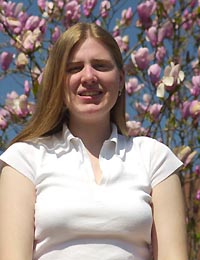|
This is an archived article.
For the latest news, go to the
Advance Homepage
For more archives, go to the Advance Archive/Search Page. | |||
|
Range Of Opportunities At UConn Enabled Heather Daniell, who is graduating with a dual major in chemistry and molecular and cell biology, says UConn has given her the opportunity to "sculpt" her education. "My independent studies and research allowed me to make my education what I wanted it to be," says Daniell, who is both an Honors Scholar and a University Scholar. "They've taken me beyond the textbook, and I've learned things that can't be taught in a classroom."
Daniell says she got the best of both worlds at UConn: the Honors Program "made a big school into a close community," she says, but the University's size also afforded her a variety of opportunities. "I think if you have somewhat of an idea of what you want to do, there are so many opportunities get into research at UConn," she says, "whether it's science or the humanities. The professors are very excited when you want to become involved in their work." Daniell, who has co-authored articles that have appeared in scientific journals, has been involved in research since her freshman year. The research started in the lab of Christian Bruckner, an assistant professor of chemistry, who is her research advisor. "He is a wonderful advisor and has provided me with many opportunities, helping me to learn a great deal," she says. She has continued to work with him. For her University Scholar project, Daniell has been conducting studies of light harvesting systems. Her project is divided into two areas, which make up her individual theses in chemistry and molecular and cell biology. The chemistry portion involves the study of molecules found in the photosynthetic apparatus of plants. "We're trying to develop artificial systems to understand the electronic properties of these molecules," Daniell says. "These molecules show great promise in a cancer therapy known as photodynamic therapy. We're trying to develop drugs for this use." The molecules may also be used in biological imaging. The molecular and cell biology portion, in the laboratory of Robert Birge, the Harold S. Schwenk Sr. Distinguished Chair in Chemistry, involves studies of a protein in the salt-water bacterium Halobacterium salinarum, which is activated by light to produce energy. "We are studying this protein for use in hybrid molecular-semiconductor computer technology and information storage systems," Daniell says. Daniell, who was accepted into a number of graduate schools, has narrowed her choices down to the University of Oxford and the California Institute of Technology. She plans to earn a doctorate in bio-inorganic chemistry. |

